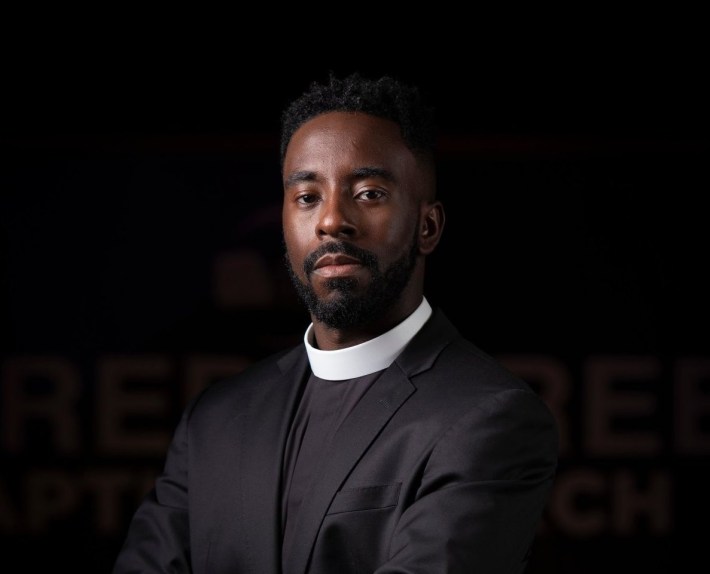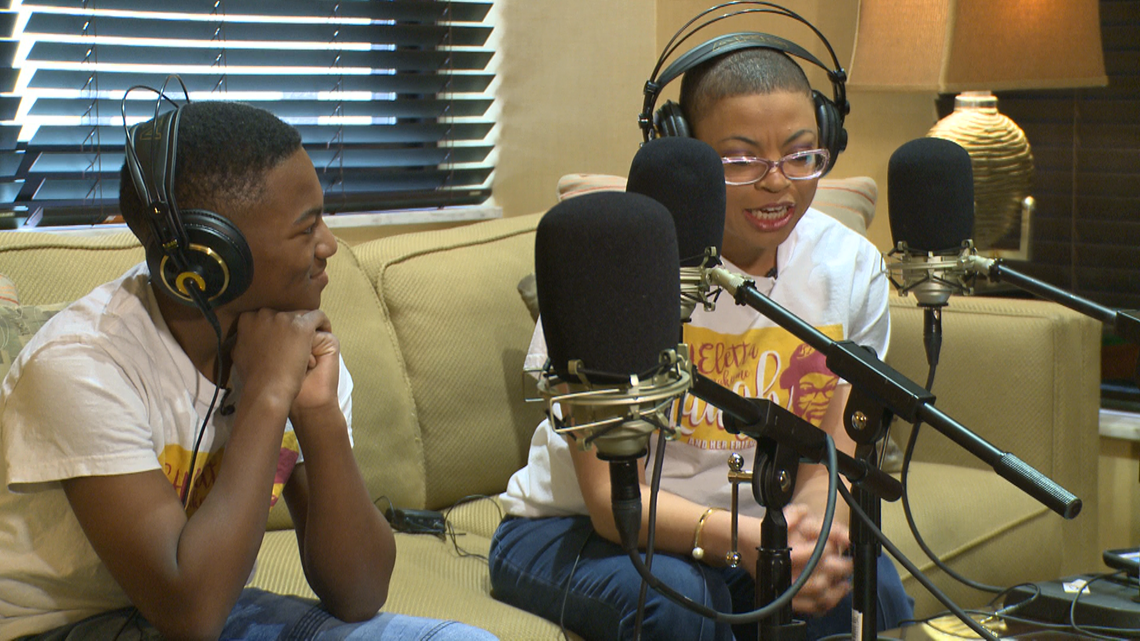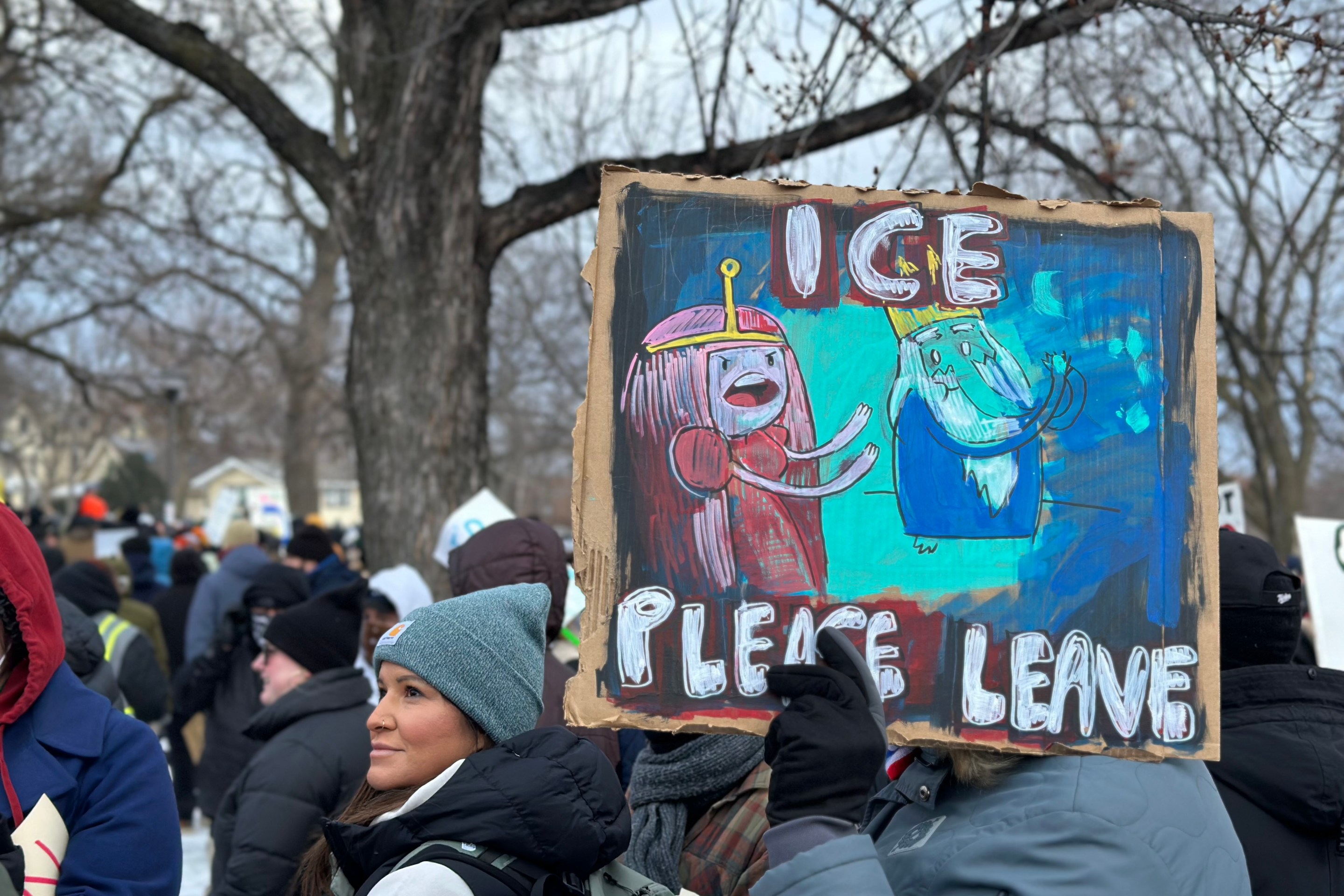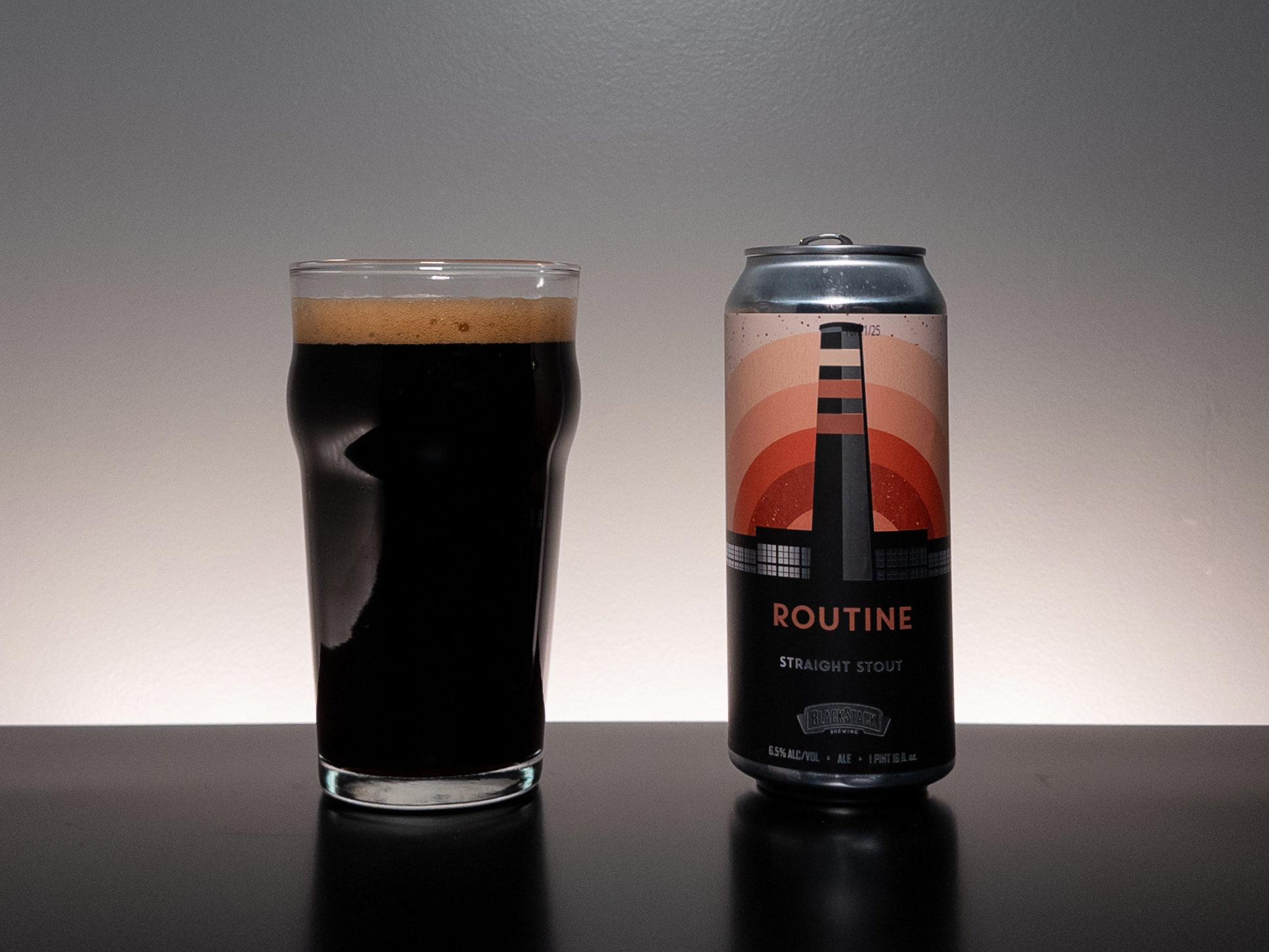When we asked Sheletta Brundidge to take us all the way back to the beginning, we meant the beginning of her current advocacy campaign.
In loose collaboration with other owners of Black media companies, the Emmy-winning radio and podcast personality has issued a challenge to 20 pastors at Black churches in the Twin Cities: To not yield the pulpit to politicians who don’t buy ads in Black-owned news outlets.
Instead Brundidge took us all the way back to 1972, inside St. Elizabeth's Hospital in Houston’s Fifth Ward.
“You know my birth certificate says ‘Negro’? It really does,” she says. “It did something to me. Good and bad, but it made me feel some kind of way.”
That document, signed just 50 years ago, seeded an activist streak in Brundidge, whose podcasting company, Sheletta Makes Me Laugh, has not collected one dime of the estimated $145 million in political ad buys currently being sprayed across Minnesota. Ditto for the state’s oldest Black newspaper, The Minnesota Spokesman-Recorder, and a buzzy digital startup supporting young journalists of color, BLCK Press.
“The Democrats have us and don’t care, and the Republicans don’t want us,” Brundidge says. “The one thing they can agree on: Not investing in Black media. Shit, they can’t agree on nothing else! What do they value? They value white, middle-class voters.”
For Brundidge, indications that both political parties take the Black vote for granted trace back to the city that imprinted its prejudices on her from Day 1.
Raising Hell from Texas to Minnesota
Amid the white flight of the ’60s and ’70s, Houston’s Fifth Ward—located just northeast of downtown—developed a hardscrabble reputation, with Texas Monthly once describing it as "Texas' toughest, proudest, baddest ghetto.” (George Floyd, one year Brundidge’s junior, grew up across town in the Third Ward.)
Brundidge still has vivid memories of the smell of cornbread and collards that would waft through Sloan Memorial United Methodist Church every two years. In preparation for dutiful visits from those seeking elected office, mothers of the congregation would scramble to polish every corner of the church and cook elaborate meals.
“If you're a politician or a skinhead, we’re going to let you sit down with us—we are!” Brundidge says. “We’re going to share our bible with you, and you stay long enough we’re going to feed you and love you. That’s just who the Black church is.”
But even at nine, she’d started noticing suspect cracks in the ritualist arrangement between politicians and the Black church. She remembers Kathy Whitmire’s successful 1981 mayoral campaign making a stop at Sloan. Whitmire, Houston’s first woman mayor, upended the good-ol’-boys political machine, with the New York Times writing:
“The developers and bankers and oil millionaires who used to handpick candidates can no longer be said to dominate the political scene. Houston is home today to too many different kinds of people, with too many different sets of values and interests, for any one group to control elections so easily.”
In 1997, Whitmire’s police chief appointee, Lee Brown, made history by becoming the city’s first Black mayor. His campaign had made the pilgrimage to Sloan as well. Those groundbreaking victories may have upset the political applecart, Brundidge says, but the institutional neglect of the Black voters that propelled them? It persisted.
“[Whitmire] waved, she rubbed me on the head, and then we didn’t see nobody for four years,” she remembers. “Even as a little girl, I knew something wasn’t right. It’s the same thing happening all these years later. As an adult, I know it is wrong.”
After the police murder of George Floyd in early 2020, politicians and corporations went into rhetorical overdrive pledging their support of racial justice initiatives.
For corporate America, the early results on those promises appear to be lagging severely. The country's 50 biggest companies committed around $50 billion to racial equity causes, the Washington Post found, yet only $1.7 billion had been disbursed by mid-last year. Making matters even sketchier: Over 90% of that total ($45.2 billion) represents financial products like loans, investments, and mortgages from which the so-called benefactors might stand to profit, WaPo reports.
Major companies have provided genuine support to Sheletta Makes Me Laugh; Hy-Vee, Camping World, Bremer Bank, and Comcast are among the two-year-old platform’s advertisers. SMML, BLCK Press, and Sahan Journal, all of which launched in the past three years, have benefited from generous grants.
The purse strings of politicians are proving more stubbornly tied.
Independent journalist Georgia Fort made a name for herself via fearless, on-the-ground reporting in the aftermath of Floyd’s murder. Her company, BLCK Press, employs a nine-woman newsroom that’s dedicated to representing Black communities in ways the mainstream press can’t or refuses to do; a spinoff TV program is in the works.
“Ultimately the concern I have about our collective political leadership, what we’re seeing in this climate, is: Do candidates care about the vote? Or do they care about the voters?” she says. “Meaning, you show up to a Black church to get the Black vote, but do you truly care about the people behind those votes?”
Fort invokes Operation Breadbasket, a 1962 initiative from the Southern Christian Leadership Conference that encouraged boycotting white-owned establishments that didn’t employ Black workers or buy from Black businesses. Reverends Martin Luther King Jr. and Jesse Jackson helped grow the program, whose slogan read "Keep a slice of the 'bread' in your community." Operation Breadbasket would evolve into Jackson’s Operation PUSH by the 1980s, when it spearheaded boycotts against Anheuser-Busch, Coca-Cola, and CBS as the reverend eyed the White House alongside his progressive Rainbow Coalition.

“We’re not selling T-shirts, services, food: We sell advertising, some of us have subscription models,” says Fort, noting that she’d scrutinize any proposed political ad buys through a journalistic lens before accepting. “We’re often being left out of this conversation of equity and inclusion. When you talk about political candidates, why do they short-change Black media? You tell me what political candidate is campaigning at white churches? They’re not. They’re going to KSTP, ‘CCO, Odyssey, Clear Channel–they’re patronizing and supporting white-owned, established media companies. It’s not right and it’s not fair.”
“Quite frankly,” she adds, “I’m speaking out about this because it affects my ability to stay in business.”
The Minnesota Spokesman-Recorder has been in business since 1934, having navigated the protracted booms and current long bust of the news industry. Founded by Cecil E. Newman, the Southside institution is now helmed by his granddaughter, Tracey Williams-Dillard. She reports that advertising from political campaigns was never robust, but it seems to be bottoming out today. Like Fort and Brundidge, Williams-Dillard has received zero ad dollars from either party this midterm election cycle.
“Anyone trying to spend advertising or trying to get a message out to, specifically, the minority community, needs to use the vehicles in which the minority community receives their information,” she says. “And if you don’t? I don’t know how much you care.”
Party Response, Political Realities
DFL Chair Ken Martin calls allegations that his party isn’t investing in Black-owned media "unfair," "absolutely false," and "incorrect.” He cites the party’s annual $50,000-ish spend with the Minnesota Multicultural Media Consortium (MMMC), a marketing/advertising outfit that services a collection of local POC-geared newspapers and radio stations. Charges that the DFL has taken advantage of free facetime in Black churches for decades, resulting in annual eyerolls and agitation from parishioners? “That’s just not accurate,” Martin says.
The chairman talked with Brundidge in August, and claims he never saw an ad proposal after their conversation. (Brundidge provided Racket with email screengrabs demonstrating that she did, in fact, send her media kit to the DFL that month.) Martin says he hasn’t heard from the Spokesman-Recorder or BLCK Press, either. He puts the onus on them.
“We have and will continue to invest in specialty or ethnic media or race media, whatever you want to call it,” he says. “I know Sheletta is not happy that we’re not working through her. That’s a much different piece. Some of these outlets don’t have quite the reach as the consortium that we’re working with.”
(Al McFarlane of Insight News, who heads the MMMC, couldn’t be reached for comment; the Minnesota GOP ignored repeated interview requests.)
Of the $18 million the DFL has raised this cycle, Martin says less 1% goes toward paid advertising. The bulk of the cash is invested in field offices and organizing, he says, adding that the real ad money can be found with individual candidate campaigns, not the state party.
Christopher Terry, an assistant professor of media law at the U of M, says Washington, D.C.-based super PACs like the Congressional Leadership Fund are responsible for an overwhelming amount of the ad blitz Minnesota voters are subjected to.
Two things are working to the disadvantage of smaller, startup POC news operations seeking ads, he says: The fact it’s a lower-key midterm election and the lack of competitive races throughout the state; only the gubernatorial fight (Tim Walz vs. Scott Jensen) and the 2nd District contest (Angie Craig vs. Tyler Kistner) are attracting big money this cycle.
“[Outside groups] don’t look out for those local, diverse outlets,” he says. “They want to hit mass audiences with a bomb of messages. It’s a scale thing. Everything they do is focus-group tested, run through some lobby shop.”
There are notable exceptions, Terry says, including the neck-and-neck U.S. Senate brawl between Ron Johnson and Mandela Barnes across the border in Wisconsin. Groups are flooding Latino radio stations with cash to influence that outcome, he says.
“[Brundidge’s outspokenness] might move the needle next time,” Terry says, predicting that the influx of 2024 ads will be “terrifying” in scope. “This time? Sheletta is focused on the right now, and it’s a legitimate question, but the facts of right now are why you’re not seeing ads. The need to hit more targeted audiences in a close presidential race changes the metrics on all of the rest of it.”
Keeping the Faith
The leaders of local Black churches have proven more sympathetic to Brundidge’s crusade than the DFL has. Half of the 20 parishes have responded to her letter challenging them to halt the practice of “giving [politicians] a platform in our churches for free... that's got to stop."
“They don’t do white voters like that,” she says.
Rev. Elijah McDavid III took over Fellowship Missionary Baptist Church in north Minneapolis two years ago. Unlike the DFL’s Martin, the youthful pastor senses real fatigue emanating from his flock each time election season rolls around; decades of politicians glad-handing with the reliable Black vote have taken a toll, trust-wise.
“It’s a long-term, deep-seated feeling that I know a lot of people in our congregation carry,” McDavid says. “They see people election cycle after election, come in, get acknowledged in church, but they never feel that connection outside of election season. That repeated frustration is felt. As a pastor, it’s my responsibility to make sure our congregation never feels used in any way.”

Brundidge’s letter was “a surprise moment for me,” he says, one that he’s grateful for. Now, when a politician asks to speak in front of Fellowship Missionary Baptist Church, they must first meet with McDavid to hash out the criteria: What can we expect you to accomplish, how will we hold you accountable if you win?
“People need to—especially politicians—consider what it means to fully reach our community, and not just in the traditional or expected ways,” he says. “But to also sew in and support our Black-owned businesses and our media outlets, and not just simply extract from our community.”
Another pastor, Brian Herron of Zion Baptist Church, found his way to the church after a stint in prison. A 2001 extortion case landed the then-Minneapolis City Councilmember inside Duluth’s Federal Prison Camp. "I spent a year with God,” he told MPR News, summarizing his life-changing 12 months behind bars. By 2006, after his father retired as pastor at Zion, Herron transitioned from politics to the pulpit, where his sermons often hit on themes of redemption and grace.
Like McDavid, the North Side pastor says the letter from Brundidge “kind of shocked” him, and that his congregation has also begun viewing visiting politicians with healthy doses of skepticism.
“Our vote carries a lot of weight, and yet you don’t invest and advertise in the media that reaches our community, in particular?” Herron says. “I will and I have, ever since I read that letter, challenge those I’ve spoken with, and ask them: Have you done any ads in the Black media or media of color? Most of them just get this blank look and say, ‘Well, so and so is doing an article on me…’ No, that’s different than an ad. And I would advise you, if you want our vote, to put your campaign ads in our media outlets.”
For Brundidge, the excuse-making from entrenched political machines falls on tired, exasperated ears. “I pretty much could tell you the script… they have every excuse in the world for not investing in Black media,” she says.
It’s unfathomable to Brundidge that polished, deeply financed campaigns—ones equipped with PR teams, marketing reps, media experts, ad-firm contractors, and focus groups—could spout so much dialogue about equity, then simply forget to invest in ways that would enhance it. It’s not an oversight, according to Brundidge—it’s intentional. But, as she learned early on in Houston, when the deck is stacked against you, you’ve gotta make noise and fight like hell to get ahead. And that’s exactly what she’s doing.
“Black people understand that we’ve always had to fight. We understand that the Constitution wasn’t written for us,” Brundidge says. “But don’t you come out here in our face, and say that you support us, stand with us, and you are all about racial reckoning. No, no, no, don’t do that. Because we are going to hold you accountable. We own our own companies now. We are intelligent. We understand how to read a campaign finance report. And we have too many reputable, respected, and successful Black media businesses that reach communities of color in the Twin Cities.”







